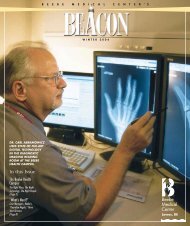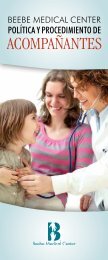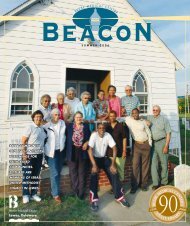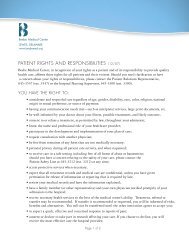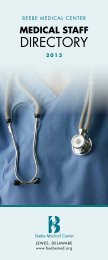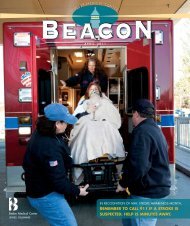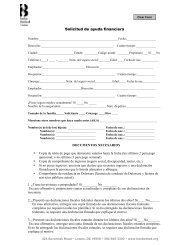BEACON â July 2009 - Beebe Medical Center
BEACON â July 2009 - Beebe Medical Center
BEACON â July 2009 - Beebe Medical Center
- No tags were found...
Create successful ePaper yourself
Turn your PDF publications into a flip-book with our unique Google optimized e-Paper software.
Think Safety This SummerCoastal Delaware offers a place for summer fun, with its ocean fishing, beachesand inland waterways, amusement parks, campgrounds, swimming pools, and golfcourses. But just like any other place, unexpected injuries happen, and we need tothink about safety first. <strong>Beebe</strong> <strong>Medical</strong> <strong>Center</strong> is ready for you in an emergency. OurLevel III Trauma <strong>Center</strong>, established in 1999, has been continually re-verified by theCommittee on Trauma of the American College of Surgeons. <strong>Beebe</strong> has five traumasurgeons available 24 hours a day and other qualified personnel who are able tostabilize and care for trauma patients. Each year more than 600 patients are treatedat <strong>Beebe</strong> for traumas, including injuries suffered from motor vehicle collisions,boating accidents, ATV rollovers, dangerous riptides, falls, and bicycle accidents.<strong>Beebe</strong>’s Trauma Department works hard to help those in our community avoidthese often serious injuries. Three Trauma Team members, Jen Whaley, RN, CCRN,Trauma Program Manager; Cheryl Littlefield, RN, Trauma and Emergency ManagementCoordinator; and Michelle Arford-Granholm, CSTR, Trauma Registrar, regularlygo out into the community to educate people on injury prevention. They take partin safety checkpoints, safety days at local parks and schools, and speak to manyin the community. As <strong>Beebe</strong>’s Injury Prevention Team, they participate in SafeKids Delaware and are members of the Injury Prevention Coalition of Delaware.Included here are some of their reminders to help you avoid a serious injury.Water Safety• Always swim or surf at a beach thatis patrolled by lifeguards.• Never swim alone.• Don’t run and dive into the waterif you do not know how deep it is.• If caught in a rip current, float withit and signal for help.• Understand the posted flag warnings.Head InjuriesMain causes include motor vehicle collisions, bicycle or motorcycle wrecks, fallsfrom windows, and falls around the house. Head injuries can be life-threatening.Seek emergency care if you notice any of the following symptoms:• Any symptom that is getting worse, such as headache, nausea, or sleepiness• Nausea that doesn’t go away• Changes in behavior, such as irritability or confusion• Dilated pupils (pupils that are bigger than normal) or pupils of different sizes• Trouble walking or speaking• Drainage of bloody or clear fluids from ears or nose• Vomiting, seizures, and weaknessor numbness in the arms or legsBiking & In-line SkatingAlways wear helmets and other fullprotectivegear. Always maintain control.Bike and skate in areas withouttraffic. Don’t bike or skate at nightwhen others can’t see you and youcan’t see obstacles in your path.Play it Safe!<strong>Beebe</strong> Trauma Team members take part in the DelDOT bike safetycheckpoints. Pictured (left to right) are Cheryl Littlefield, RN, andMichelle Arford-Granholm, CSTR.4


